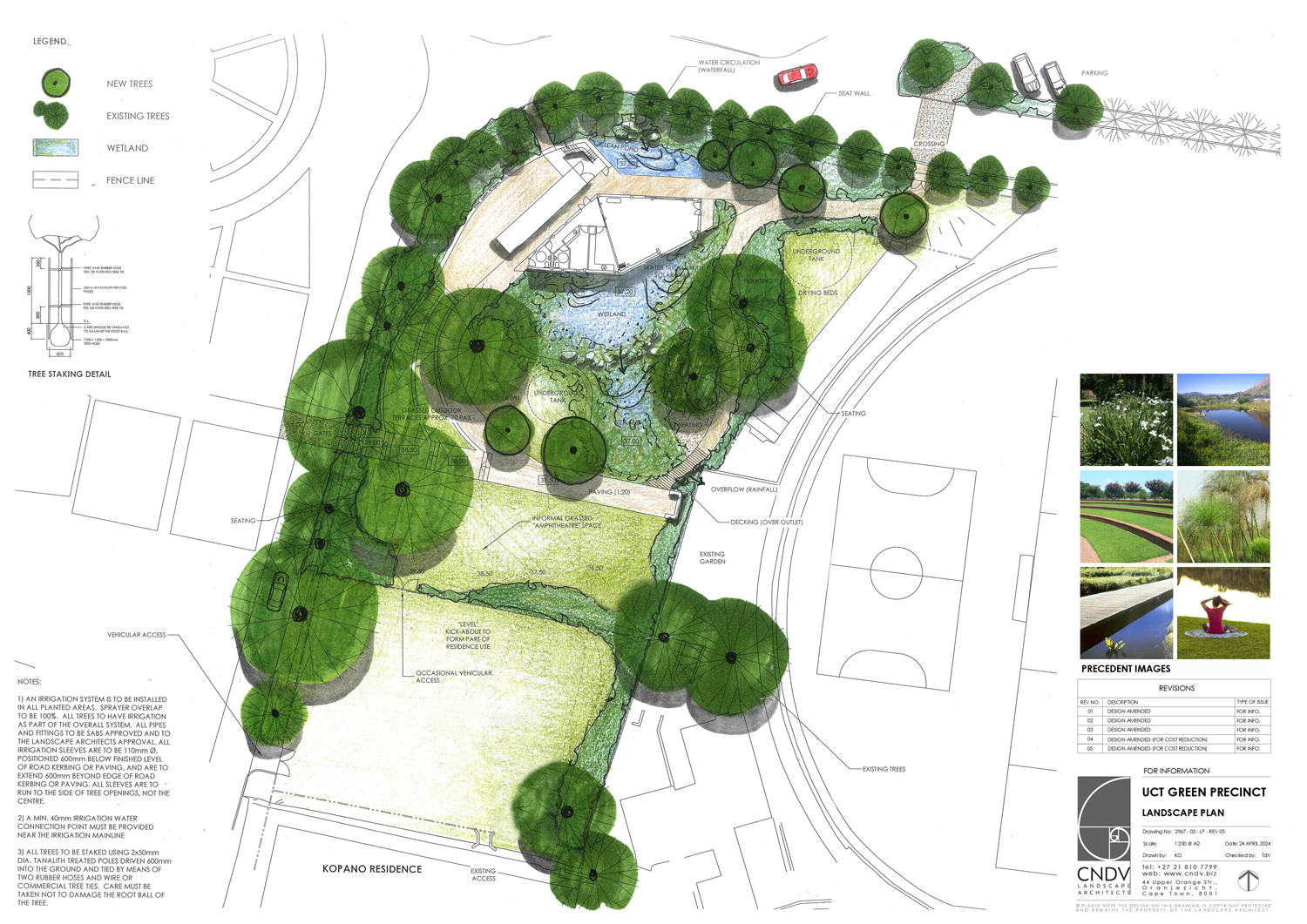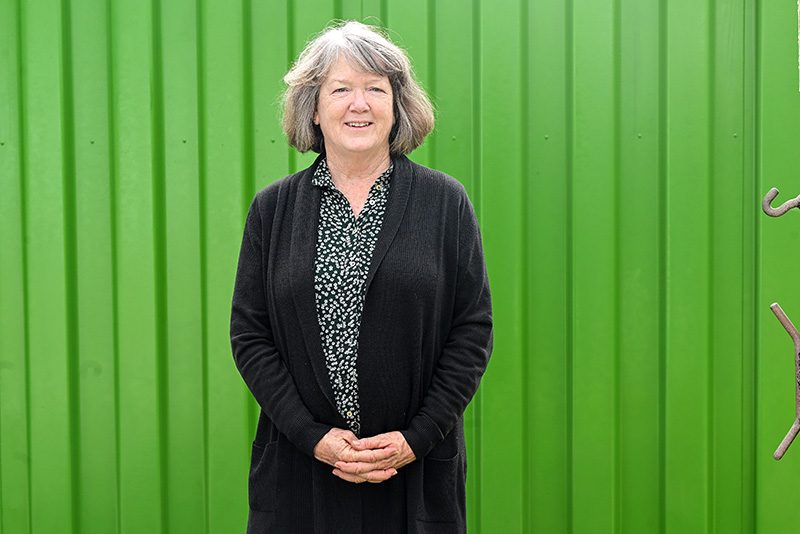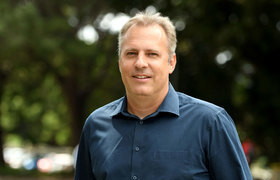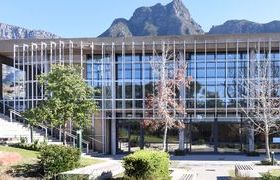UCT breaks ground on flagship Green Precinct
24 July 2025 | Story Myolisi Gophe. Photos Lerato Maduna. Drawing CNDV Landscape Architects. Voice Cwenga Koyana. Read time 7 min.
With shovels in hand and the sun shining brightly on a cold winter’s day, the University of Cape Town (UCT) celebrated the official sod-turning ceremony for its ambitious Green Precinct and Water Treatment Facility on lower campus. This flagship project is set to transform the university’s approach to water sustainability, research and community well-being.
Held next to Kopano Residence on 21 July 2025, the event marked a major milestone in UCT’s multi-year water resilience programme. Funded by the Department of Higher Education and Training (DHET), this initiative forms part of a broader response to Cape Town’s 2017/2018 drought, which revealed critical vulnerabilities in the city’s water supply and management systems.
“This project has been years in the making,” said Manfred Braune, UCT’s director of Environmental Sustainability. “We began planning more than five years ago after the drought reminded us just how urgent water security is – not just for Cape Town, but for institutions like UCT that house and serve thousands of people.”
Smart water solutions
In the years following the crisis, the university undertook a comprehensive effort to reduce water consumption, especially in high-use areas such as student residences. In 2019, a consulting engineering firm was commissioned to develop a water sustainability strategy, laying the groundwork for smart water meter installations, underground water infrastructure mapping and water-saving retrofits in bathrooms.
“The university undertook a comprehensive effort to reduce water consumption, especially in high-use areas such as student residences.”
The centrepiece of UCT’s strategy is the Green Precinct and its cutting-edge on-site water recycling facility. Scheduled for completion in December 2025, this plant will treat wastewater from nearby residences and academic buildings, making it safe for uses such as toilet flushing, irrigation and maintaining sports fields – saving thousands of litres of potable water annually.
At the event, UCT Vice-Chancellor Professor Mosa Moshabela emphasised the importance of the initiative: “We’ve been through tough times and we’re still going to go through tough times when it comes to water and the need for water treatment. UCT has always played a pivotal role (in coming up with solutions), especially during the drought.”
A unique aspect of the Green Precinct is its dual role as both infrastructure and learning environment. In partnership with UCT’s Future Water Institute, the site will serve as a living laboratory for water management research, teaching and innovation. Plans include an interpretative centre and landscaped gardens where students and researchers can engage directly with ecological systems and sustainability technologies.
Sanctuary for spiritual, cultural reflection
Beyond its educational function, the garden space will also provide a quiet sanctuary for spiritual and cultural reflection. Championed by the Department of Student Affairs, this area is intended as a safe, inclusive space for prayer, meditation and traditional practices.
“The garden will be a healing space; a space of meaning,” said Braune. “It reflects our commitment to the whole student experience, not just academically, but socially and spiritually.”
Open exclusively to UCT staff and students, the garden will retain Kopano’s existing open grass area as a recreational hub for residence students. Upgrades will include improved drainage as part of the project’s broader infrastructure upgrades.

The Green Precinct also aims to set a new benchmark in green design. UCT is pursuing a suite of prestigious certifications from the Green Building Council South Africa (GBCSA), including a 4-Star Green Star rating and Net-Zero certifications for water, carbon and ecology.
“This project is boldly breaking new ground,” said Braune. “UCT has previously pursued Green Star ratings for new buildings, but this is the first time we’re targeting multiple Net-Zero certifications. The lessons we learn here will guide future green building projects at UCT and beyond.”
Sustainability credentials
These sustainability credentials are aligned with UCT’s Vision 2030 and the Vice-Chancellor’s Khusela Ikamva Sustainable Campus initiative, which seeks to position the university campus as a model of transformative, environmentally conscious practices.
In his address, Professor Moshabela praised the extensive collaboration and stakeholder engagement behind the project’s success, a process that has spanned nearly three years.
“If we are going to see the success of our initiatives at UCT, we have to join hands and collaborate, not act in silos. Some of these initiatives are big and we can’t do them alone. We need different expertise and collective effort.”

He also noted that the project exemplifies how infrastructure can support innovation and learning. “It is important that these initiatives are not just operational. They must also enrich our students’ learning and contribute to research. We must ensure that the link to industry becomes a key focus going forward. This is how we extend our impact beyond the campus.
Moshabela called for even stronger links between the university, government and industry – the “triple helix” of collaboration – as key to ensuring long-term societal impact. “I am confident that the Western Cape government is and will continue to be interested in this initiative. Bringing the university, government and industry together is a powerful model for change.”
Combining research and real-world impact
Associate Professor Kirsty Carden, the director of UCT’s Future Water Institute, said the project has been a unique opportunity to combine research and real-world impact.
“It presents a wonderful opportunity to engage in a campus-based ‘living laboratory’ showcasing several water sustainability innovations, including alternative water sources, decentralised wastewater treatment, resource recovery and nature-based solutions for stormwater management.”
She added that the facility will support research, teaching and community engagement. “We look forward to using the space not only in academic contexts, but also in partnership with non-academic partners and community organisations. The lessons learned here will be shared more broadly with civil society.”
 This work is licensed under a Creative Commons Attribution-NoDerivatives 4.0 International License.
This work is licensed under a Creative Commons Attribution-NoDerivatives 4.0 International License.
Please view the republishing articles page for more information.
Related










